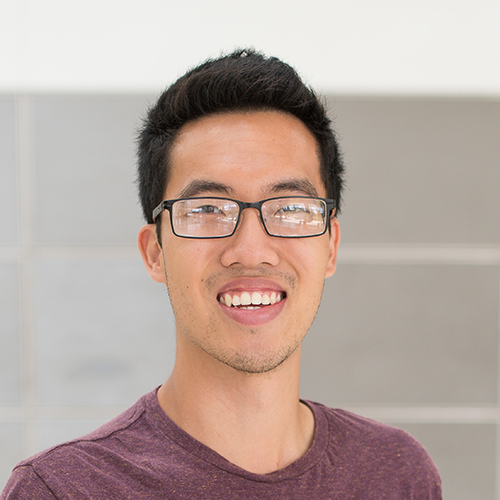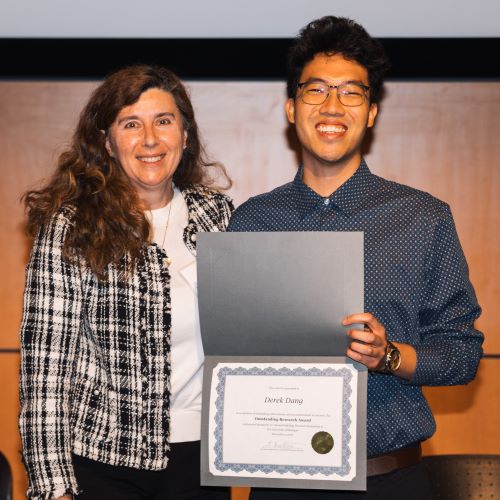

Molecular and Cellular Pathology graduate student, Derek Dang, successfully defended his thesis, “Beyond the Warburg Effect: A study of metabolic alterations in malignancies of the posterior fossa” on January 19, 2024, becoming Dr. Derek Dang.
 Dang’s research focuses on MYC-driven Group 3 medulloblastomas (MB), which are aggressive pediatric brain cancers with a very poor prognosis. These tumors tend to be very heterogeneous, meaning there is a great deal of variety in the genetic or molecular properties of the tumors. Dang focused on the most common metabolic alteration found in MB, the MYC gene. In the past, researchers have focused directly on the MYC gene, without much success, so Dang decided to investigate further upstream. He found that these tumors depend not only on glucose-derived carbons for their metabolism, but also on mitochondrial metabolism. Mitochondrial metabolism utilizes an enzyme called DLAT to regulate a copper-dependent cell death mechanism, cuproptosis. Dang found that DLAT could be targeted via IDH1 inhibition, leading to cancer cell death. “These findings are important because they reveal multiple strategies that we can use to target elevated mitochondrial metabolism in Group 3 Medulloblastoma,” said Dang.
Dang’s research focuses on MYC-driven Group 3 medulloblastomas (MB), which are aggressive pediatric brain cancers with a very poor prognosis. These tumors tend to be very heterogeneous, meaning there is a great deal of variety in the genetic or molecular properties of the tumors. Dang focused on the most common metabolic alteration found in MB, the MYC gene. In the past, researchers have focused directly on the MYC gene, without much success, so Dang decided to investigate further upstream. He found that these tumors depend not only on glucose-derived carbons for their metabolism, but also on mitochondrial metabolism. Mitochondrial metabolism utilizes an enzyme called DLAT to regulate a copper-dependent cell death mechanism, cuproptosis. Dang found that DLAT could be targeted via IDH1 inhibition, leading to cancer cell death. “These findings are important because they reveal multiple strategies that we can use to target elevated mitochondrial metabolism in Group 3 Medulloblastoma,” said Dang.
For the past five years, Dang has been a member of the Dr. Sriram Venneti laboratory. He selected the Venneti lab as he was interested in brain development and cancer. During his undergraduate years, he worked in the laboratory of Dr. Kathleen Millen, who studied malformations that occur during cerebellar development. In cancer, specific pathways which are important for proper development do not turn off as they should, leading to uncontrolled cell growth. When he joined the Venneti lab, he was able to expand upon what he had learned as an undergraduate.
“The biggest challenge in research is that biology is never as simple as you hope it will be. You need to be creative to answer some of these questions with experimental and technical approaches as well as the theoretical approaches. My mentor was able to help me think outside the box and consider alternative methods that could be driving the process,” explained Dang.
 Some of Dang’s favorite times as an MCP student included participating in the Molecular and Cellular Pathology Research Symposia. “This is such a great celebration of all our research. I like the fact that they are all student run.” In addition, he also appreciates all the team bonding activities in the program, “We have a very tight-knit community here in the Pathology department, especially with the students. I enjoyed spending time with them doing community service events or going on the camping trip that we go on every summer. I have been able to be involved in a little bit of everything and to really connect with a lot of the students. I wish I had been more involved in teaching, though. I volunteered and taught middle schoolers and high schoolers, but I wish I had chosen to teach a college-level course.” Dang went on to address the overall program saying, “The MCP program has such a wide range of research opportunities. We can work on pretty much every disease or disease model you can think of. It has a very strong emphasis on becoming a well-rounded scientist. If you are interested in doing statistics or science writing, there are also opportunities for that. The student group is fantastic, and we are very supportive of each other.”
Some of Dang’s favorite times as an MCP student included participating in the Molecular and Cellular Pathology Research Symposia. “This is such a great celebration of all our research. I like the fact that they are all student run.” In addition, he also appreciates all the team bonding activities in the program, “We have a very tight-knit community here in the Pathology department, especially with the students. I enjoyed spending time with them doing community service events or going on the camping trip that we go on every summer. I have been able to be involved in a little bit of everything and to really connect with a lot of the students. I wish I had been more involved in teaching, though. I volunteered and taught middle schoolers and high schoolers, but I wish I had chosen to teach a college-level course.” Dang went on to address the overall program saying, “The MCP program has such a wide range of research opportunities. We can work on pretty much every disease or disease model you can think of. It has a very strong emphasis on becoming a well-rounded scientist. If you are interested in doing statistics or science writing, there are also opportunities for that. The student group is fantastic, and we are very supportive of each other.”
Now that Dang has completed his doctoral studies, he will soon be departing to complete a fellowship at the Centers for Disease Control. “I’ll be in Atlanta for a month starting in July for training, then in Milwaukee for a couple of years after that,” said Dang.
Please join us in congratulating Dr. Derek Dang on his achievements.
If you are interested in learning more about the MCP Graduate Program, click here or email Dr. Jeff Rual at jrual@med.umich.edu.
 ON THE COVER
ON THE COVER
Breast team reviewing a patient's slide. (From left to right) Ghassan Allo, Fellow; Laura Walters, Clinical Lecturer; Celina Kleer, Professor. See Article 2014Department Chair |

newsletter
INSIDE PATHOLOGYAbout Our NewsletterInside Pathology is an newsletter published by the Chairman's Office to bring news and updates from inside the department's research and to become familiar with those leading it. It is our hope that those who read it will enjoy hearing about those new and familiar, and perhaps help in furthering our research. CONTENTS
|
 ON THE COVER
ON THE COVER
Autopsy Technician draws blood while working in the Wayne County morgue. See Article 2016Department Chair |

newsletter
INSIDE PATHOLOGYAbout Our NewsletterInside Pathology is an newsletter published by the Chairman's Office to bring news and updates from inside the department's research and to become familiar with those leading it. It is our hope that those who read it will enjoy hearing about those new and familiar, and perhaps help in furthering our research. CONTENTS
|
 ON THE COVER
ON THE COVER
Dr. Sriram Venneti, MD, PhD and Postdoctoral Fellow, Chan Chung, PhD investigate pediatric brain cancer. See Article 2017Department Chair |

newsletter
INSIDE PATHOLOGYAbout Our NewsletterInside Pathology is an newsletter published by the Chairman's Office to bring news and updates from inside the department's research and to become familiar with those leading it. It is our hope that those who read it will enjoy hearing about those new and familiar, and perhaps help in furthering our research. CONTENTS
|
 ON THE COVER
ON THE COVER
Director of the Neuropathology Fellowship, Dr. Sandra Camelo-Piragua serves on the Patient and Family Advisory Council. 2018Department Chair |

newsletter
INSIDE PATHOLOGYAbout Our NewsletterInside Pathology is an newsletter published by the Chairman's Office to bring news and updates from inside the department's research and to become familiar with those leading it. It is our hope that those who read it will enjoy hearing about those new and familiar, and perhaps help in furthering our research. CONTENTS
|
 ON THE COVER
ON THE COVER
Residents Ashley Bradt (left) and William Perry work at a multi-headed scope in our new facility. 2019Department Chair |

newsletter
INSIDE PATHOLOGYAbout Our NewsletterInside Pathology is an newsletter published by the Chairman's Office to bring news and updates from inside the department's research and to become familiar with those leading it. It is our hope that those who read it will enjoy hearing about those new and familiar, and perhaps help in furthering our research. CONTENTS
|
 ON THE COVER
ON THE COVER
Dr. Kristine Konopka (right) instructing residents while using a multi-headed microscope. 2020Department Chair |

newsletter
INSIDE PATHOLOGYAbout Our NewsletterInside Pathology is an newsletter published by the Chairman's Office to bring news and updates from inside the department's research and to become familiar with those leading it. It is our hope that those who read it will enjoy hearing about those new and familiar, and perhaps help in furthering our research. CONTENTS
|
 ON THE COVER
ON THE COVER
Patient specimens poised for COVID-19 PCR testing. 2021Department Chair |

newsletter
INSIDE PATHOLOGYAbout Our NewsletterInside Pathology is an newsletter published by the Chairman's Office to bring news and updates from inside the department's research and to become familiar with those leading it. It is our hope that those who read it will enjoy hearing about those new and familiar, and perhaps help in furthering our research. CONTENTS
|
 ON THE COVER
ON THE COVER
Dr. Pantanowitz demonstrates using machine learning in analyzing slides. 2022Department Chair |

newsletter
INSIDE PATHOLOGYAbout Our NewsletterInside Pathology is an newsletter published by the Chairman's Office to bring news and updates from inside the department's research and to become familiar with those leading it. It is our hope that those who read it will enjoy hearing about those new and familiar, and perhaps help in furthering our research. CONTENTS
|
 ON THE COVER
ON THE COVER
(Left to Right) Drs. Angela Wu, Laura Lamps, and Maria Westerhoff. 2023Department Chair |

newsletter
INSIDE PATHOLOGYAbout Our NewsletterInside Pathology is an newsletter published by the Chairman's Office to bring news and updates from inside the department's research and to become familiar with those leading it. It is our hope that those who read it will enjoy hearing about those new and familiar, and perhaps help in furthering our research. CONTENTS
|
 ON THE COVER
ON THE COVER
Illustration representing the various machines and processing used within our labs. 2024Department Chair |

newsletter
INSIDE PATHOLOGYAbout Our NewsletterInside Pathology is an newsletter published by the Chairman's Office to bring news and updates from inside the department's research and to become familiar with those leading it. It is our hope that those who read it will enjoy hearing about those new and familiar, and perhaps help in furthering our research. CONTENTS
|
 ON THE COVER
ON THE COVER
Rendering of the D. Dan and Betty Khn Health Care Pavilion. Credit: HOK 2025Department Chair |

newsletter
INSIDE PATHOLOGYAbout Our NewsletterInside Pathology is an newsletter published by the Chairman's Office to bring news and updates from inside the department's research and to become familiar with those leading it. It is our hope that those who read it will enjoy hearing about those new and familiar, and perhaps help in furthering our research. CONTENTS
|

MLabs, established in 1985, functions as a portal to provide pathologists, hospitals. and other reference laboratories access to the faculty, staff and laboratories of the University of Michigan Health System’s Department of Pathology. MLabs is a recognized leader for advanced molecular diagnostic testing, helpful consultants and exceptional customer service.